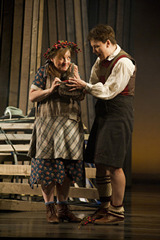| Opera Reviews | 19 April 2024 |
Hansel and Gretel in times of austerityby Catriona Graham |
|
| Humperdinck: Hansel and Gretel Scottish Opera Edinburgh Festival Theatre February 2012 |
|
|
The curtain rises on designer Tim Meacock's soaring columns of wood panelling and oversized furniture amongst which Gretel (in grubby pinafore) and Hansel (with scabby knees and one sock fallen to the ankle) sing, dance and squabble, instead of the knitting and broom-making they are supposed to be doing to contribute to the domestic economy. No wonder their mother Gertrude (Shuna Scott Sendall) is so frazzled that, in a rush of temper, she sends the children out to gather strawberries in the wood. As she bewails her lot, the subtle vibrato adds poignancy and contrasts with the inebriated jollity of her husband Peter when he comes back from town. Paul Carey Jones is large of gesture and voice, switching easily from brightness to dark when he realises the children are in danger. Meanwhile, in a clearing, Gretel (Ailish Tynan) sings charmingly a little folksong before Hansel (Kai Rüütel) brings strawberries with which they stuff their faces - singing another charming song imitating the cuckoo heard in the wood. Their voices blend well, being sufficiently different in timbre and, when necessary, they can sound decidedly petulant. On the night, however, Tynan's voice had a tendency to sound a bit tight. But, as they realise they are lost and it is getting dark, the wooden columns slowly, scarily move in closer and flashes of fire - will o' the wisps - startle. The frightened children hug tight and the Sandman (Miranda Sinani) sings them to sleep in a sweet clear voice. As the children sing their Evening Prayer about fourteen angels surrounding them as they sleep, the Sandman smilingly looks on and, magically, stars appear amongst the trees. Then as the children fall asleep, fourteen proper golden-haired angels - male and female - in long white gowns and big golden wings soundlessly emerge from the dark and move round till the stage is filled and their gaze is bent on the sleeping children. Woken tunefully at dawn by the Dewman (Marie Claire Breen), the children soon discover a picture-book gingerbread house and start breaking off and scoffing bits of icing stucco. When the witch Rosina Sugarlump (Leah-Marian Jones) emerges from the house, she is blonde, jolly, in sweety-pink candystripe frock and disconcertingly Welsh black hat. At which point, it is worth mentioning director Bill Bankes-Jones's translation into a supple vernacular English, using assonance as much as end-rhymes. The witch's alliteration and lip-smacking droolings are as much fireworks as those which accompany her broomstick song and dance. Once Gretel has tipped the witch into the oven it becomes apparent that Tynan is about the same height as the freed gingerbread children - all twenty of them. Their exuberant bouncing around and dancing is well choreographed by Kally Lloyd-Jones. In the pit, conductor Emmanuel Joël-Hornak and the orchestra bring out both the Wagnerian overtones in Humperdinck's music as well as the simpler folky tunes. |
|
| Text ©
Catriona Graham Photo © Richard Campbell |

 There
may be a certain topicality about staging Humperdinck's Hansel and
Gretel in early 2012, given the general economic situation, since
the opera dramatizes the well-known folktale describing the effects
of hunger.
There
may be a certain topicality about staging Humperdinck's Hansel and
Gretel in early 2012, given the general economic situation, since
the opera dramatizes the well-known folktale describing the effects
of hunger. 





